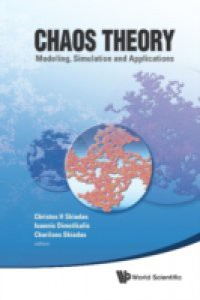The work done in chaotic modeling and simulation during the last decades has changed our views of the world around us and has introduced new scientific tools, methods and techniques. Advanced topics of these achievements are included in this volume on Chaos Theory which focuses on Chaotic Modeling, Simulation and Applications of the nonlinear phenomena. This volume includes the best papers presented in the 3rd International Conference on CHAOS. This interdisciplinary conference attracted people from many scientific fields dealing with chaos, nonlinear dynamics, fractals and the works presented and the papers included here are of particular interest that could provide a broad understanding of chaos in its various forms.The chapters relate to many fields of chaos including Dynamical and Nonlinear Systems, Attractors and Fractals, Hydro-Fluid Dynamics and Mechanics, Chaos in Meteorology and Cosmology, Chaos in Biology and Genetics, Chaotic Control, Chaos in Economy and Markets, and Computer Composition and Chaotic Simulations, including related applications.Contents:Nonlinearity of Earth: Astonishing Diversity and Wide Prospects (O B Khavroshkin & V V Tsyplakov)On a Problem of Approximation of Markov Chains by a Solution of a Stochastic Differential Equation (Gabriel V Orman)Modeling Recent Economic Debates (Christos H Skiadas)On Logistic-Like Iterative Maps (Dimitrios A Sotiropoulos)Exploring Process of Fibre Breaking in Tube Samples of Composite During Quasi-Static Process of Fracture (Dorota Aniszewska & Marek Rybaczuk)Non Hamiltonian Chaos from Nambu Dynamics of Surfaces (Minos Axenides)Multifractal and Wavelet Analysis of Epileptic Seizures (Olga E Dick & Irina A Mochovikova)Aesthetic Considerations in Algorithmic and Generative Composition (Kerry L Hagan)Freedom and Necessity in Computer Aided Composition: A Thinking Framework and Its Application (Johannes Kretz)Rendering Statistical Significance of Information Flow Measures (Angeliki Papana & Dimitris Kugiumtzis)and other papersReadership: Undergraduate and graduate students and researchers in nonlinear systems and dynamics, complex systems and fluid mechanics; mathematicians; physicists; general scientists and engineers.

